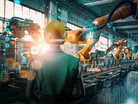Construction Companies Explore AI for Design and Planning

The construction industry is facing increasing challenges surrounding rising costs and labour and material shortages worldwide, so major companies including Balfour Beatty, Skanska, and Laing O'Rourke, are exploring the possibilities AI has to offer.
To an industry built on a hands on approach, AI integration could seem sceptical, but experts believe generative AI (generative here meaning AI that is employed in various industry sectors), could pull the construction industry out of the slump of shortages.
Currently, the industry’s use of AI isn’t maximised, and data capture practices are sluggish to incorporate changes and require human intervention to forecast outcomes and costs.
Additionally, it takes time, resources and skill to assess a project’s viability, measure risk, manage schedules and allocate resources and funding. Yet these early design and planning stages are crucial to a project’s success.
Given these challenges, the construction industry is taking the leap to explore how it can best action generative AI at the vital design and planning stages – to reduce overhead costs, transform the supply chain and ultimately boost financial outcomes.
How can generative AI help the construction industry?
On a broad scale, generative AI allows businesses to use algorithms that learn from historical data, and therefore past mistakes.
For architects and engineers, the use of AI can optimise building designs, floor plans, and construction blueprints amongst many other initial stages in construction, and all gathered information can be efficiently shared with supply chains, allowing them to respond to any necessary changes.
Listed below, are some of the hottest opportunities for AI to be utilised in the design and planning stages of construction:
3D infra-red technology:
3D infrared technology is a technique that uses thermal imaging cameras to detect defects and energy inefficiencies in buildings.
Through this technology, the industry can gather data from a variety of locations, including spaces previously inaccessible to humans, and gain an understanding of built environments to design the most efficient and sustainable outputs.
Automation and robotics of tasks:
Generative AI models can be trained to automate and roboticise various tasks that are repetitive, dangerous, time-consuming, or require significant human effort.
Tasks such as data entry, document processing, customer service, and aspects of logistics and inventory management, which can free up human resources and allocate them to more complex and strategic tasks.
Demand forecasting and inventory optimisation:
Generative AI models can analyse market trends and consumer behaviour patterns, to provide accurate demand forecasts.
This can help businesses optimise their inventory levels, reducing overstocking and stockouts, and minimising waste and carrying costs.
Predictive maintenance:
To help businesses proactively schedule maintenance activities, reduce downtime and maximise asset utilisation, generative AI can monitor and analyse data from various sources, such as sensors and machine logs, to predict equipment failures or maintenance needs.
Supply chain optimisation:
To help businesses reduce costs, optimise procurement, logistics, material distribution across construction sites, AI models can analyse demand patterns, supplier networks, transportation routes, and inventory levels.
Personalised customer experiences:
Despite AI’s lack of humanness, it can be used to create personalised product recommendations, marketing campaigns, and customer service interactions based on individual preferences and behaviour patterns.
All which can improve customer satisfaction and loyalty, driving increased sales and revenue.
Assistance with training, talent acquisition and knowledge sharing:
Generative AI can further assist in identifying and recruiting talent by analysing resumes, job descriptions, and candidate profiles.
And also create content such as instructional videos, manuals, and simulations, to help upskill workers, promoting knowledge transfer and skill development, and optimise labour allocations and project schedules for employees.
What big players are utilising generative AI in the construction industry?
Balfour Beatty, Skanska and Laing O'Rourke are leveraging generative AI for tasks like: design optimisation, project planning, and risk assessment through AI use such as drones, computer vision, and predictive maintenance of equipment and machinery.
Will Senner, Vice President of Preconstruction at Skanska USA Building, says that despite the "data journey" construction companies will have to go on to utilise AI effectively: “The ability to pull in insights both from historical project data, but also current project data, unlocks a lot of really interesting opportunities to improve existing processes and make our teams more efficient.”
******
Make sure you check out the latest news at Construction Digital, aBizClik brand




